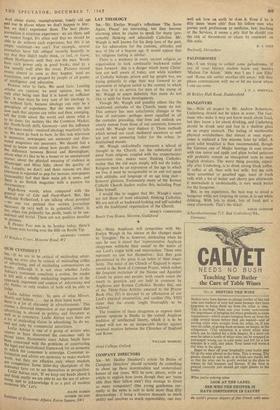SIR, —If we are to be critical of misleading adver- ti sing
we must also be critical of misleading critics of advertising, and of misleading commentators on books. Although it is not clear whether Leslie Adrian's comments constitute a review, the reader is left with a wholly misleading impression of the approach, argument and content of Advertising and the Public, as only readers of both will be able to jUdge.
Harris Adrian writes: 'In spite of what Messrs. riarris and Seldon . . say in their latest book . . . there is a lot of chicanery in advertisements' This creates a distorted impression of our argument that advertising is abused in politics and literature as well as in commerce. Leslie Adrian says there are a lot of misleading claims in advertising. So do we, and not only by commercial advertisers. Leslie Adrian is one of a group of writers who appear to have discovered the consumer only in recent years. Economists since Adam Smith have .beeri concerned with the problems of constructing lite legal and institutional framework for an economy in which the consumer is sovereign. Consumer in- formation and advice are necessary to make markets Wok, but they arc effective only where markets are competitive. Some latter-day champions of the consumer have yet to see themselves in perspective.
Leslie Adrian says, 'If we keep our heads about it and think coolly we are able to see the use of adver- tising, and to acknowledge it as a part of modern economic life.' Let's.
RALPH HARRIS Jrsrttttfeof Economic Affairs, Eaton Square, uT afftril EL re, SSTON W re, SSTON W






































 Previous page
Previous page